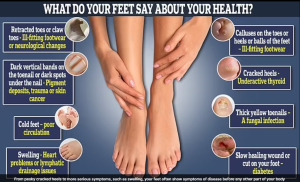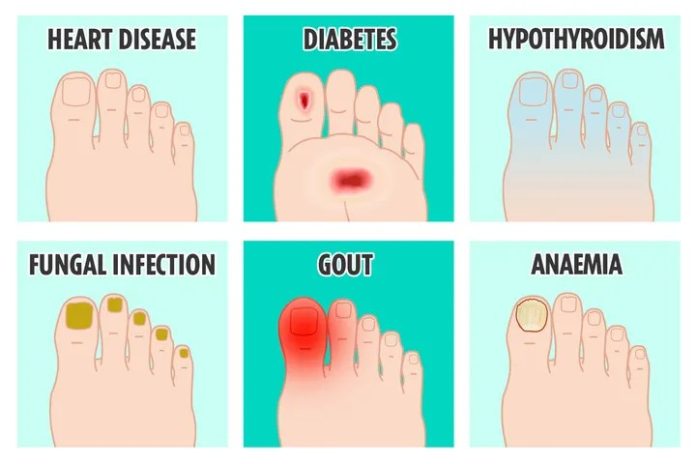According to doctors, we should regularly take a moment to look more closely at our feet, because they can offer insights into our overall health.
“In fact, they can show early indications conditions from diabetes to cardiovascular issues,” said Dr. Babak Ashrafi, a General Practitioner.
Dr. Ashrafi said: “Your feet mirror the health of your internal organs and systems, offering clues about your overall well-being. Foot health can reveal conditions ranging from circulatory issues to systemic diseases, making them an essential part of routine health assessments.”
Your feet mirror the health of your internal organs and systems, offering clues about your overall well-being
Signs in feet that could indicate health issues include:
Colour changes
Dr. Ashrafi said: “Discolouration of the feet can indicate various health issues. Blue or purple feet are often a sign of being cold. However it can also indicate poor circulation or cardiovascular problems.
“Peripheral vascular disease, caused by conditions such as diabetes or smoking, can lead to severe issues with circulation, causing blockages in the blood vessels of legs and feet.
A persistent tingling or numb sensation in your feet can also be a sign of diabetic neuropathy
“Red feet can be triggered by an allergic reaction, especially when accompanied with itching, swelling or a rash. It could also be linked to an infection, such as cellulitis, which can be caused by bacteria or fungus entering the body through small breaks in the skin.
“Tell-tale signs of an infection include redness, inflammation, pain, discharge or an odour. Seek medical assistance if you are concerned.”
Swelling
Dr. Ashrafi said: “Swelling is a common symptom of a foot or ankle injury. Elevate your foot and try not to put too much pressure or weight on the affected leg. An ice pack or compression bandage can also help reduce the swelling.
 “Oedema is the medical term for swelling that occurs when fluid is trapped in the body, usually affecting the legs or feet. It’s important that oedema is diagnosed by a Doctor in order to be treated promptly. Temporary oedema can often be improved by reducing salt intake and getting a moderate amount of exercise.
“Oedema is the medical term for swelling that occurs when fluid is trapped in the body, usually affecting the legs or feet. It’s important that oedema is diagnosed by a Doctor in order to be treated promptly. Temporary oedema can often be improved by reducing salt intake and getting a moderate amount of exercise.
“If left untreated, oedema can cause swelling that gets more and more painful, along with difficulties in walking. Persistent swelling, alongside other symptoms such as shortness of breath, fatigue and rapid or an irregular heartbeat, can be a sign of a more serious health condition such as heart failure, as the heart weakens and gradually fails to pump blood as it should.”
Numbness and tingling
Dr Ashrafi said: “A numbness or tingling sensation in your feet, when you’ve been in one position for too long, is referred to as ‘pins and needles’. A persistent tingling or numb sensation in your feet can also be a sign of diabetic neuropathy, a type of nerve damage that occurs in people with diabetes, caused by high blood sugar levels, especially if it’s affecting both sides. Speak to your doctor if you are concerned.”
Persistent swelling, alongside other symptoms such as shortness of breath, fatigue and rapid or an irregular heartbeat, can be a sign of a more serious health condition
Changes in skin and nails
Dr Ashrafi said: “Thick, yellow nails could suggest a fungal infection and can be treated at home with anti-fungal treatments. Dry, cracked heels can be a result of being on your feet for long periods of time, especially hard floors and wearing unsupportive footwear.
“In some cases, dry, cracked heels can be a sign of an underactive thyroid gland or hypothyroidism. Superdrug Online Doctor offers a Thyroid Hormone Testing Kit, with results and advice from doctors shared within 72 hours.”
Source: Evening News


